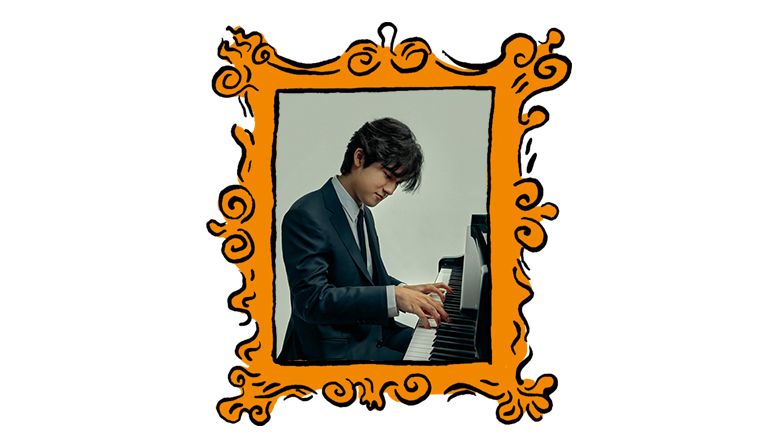My trip to the Verbier Festival had inauspicious beginnings—namely, a loud and public row with a EasyJet employee at 7.30am over the size of my cabin baggage (reader, I won, after moving a shoe from one bag to the other). And as we jetted over the Channel, I became increasingly knackered, irritable and anxious. Knowing almost nothing about classical music, I was about to be plopped down in a small Swiss mountain village with some of the world’s greatest classical musicians, including French pianist Alexandre Kantorow the day after his performance at the Olympic opening ceremony.
The best of the best music critics, journalists and musicologists would also be there. Imposter syndrome is one thing, but in Verbier, I was a genuine imposter—I don’t know my symphonies from my concertos, or even, as it transpired after watching a solo performance in a beautiful mountainside chapel, my violin from my viola. And the classical music world, famed for being snooty and elitist, does not suffer fools gladly… or so I thought…
You’d be forgiven for wondering what our culture editor Peter Hoskin was thinking when he sent me to Verbier. It was a question I asked myself many times throughout the weekend, as I watched the prodigal Yunchan Lim perform Beethoven’s fifth piano concerto with an orchestra conducted by Antonio Pappano, or Kantorow play the Chaconne from Bach’s Second Partita arranged by Brahms for the left hand. “I don’t deserve to be here,” I thought, “I don’t deserve the privilege of watching these maestros in action, of experiencing this transcendental, moving music when I don’t know the first thing about its history.”
However, while I am not a classical music expert, I am a mountain goat—and often voluntarily spend my summers plunging down the Alps on a bike or marching across the Lake District on a hike. So Pete tasked me with writing about mountain music, about what a classical music concert is like when it’s an altitude of 1,500m—when, after listening to Strauss, you can zip up to a glacier in a cable car and down again on an e-bike before dinner.
The answer: classical music in the mountains is transformative. Revelatory. Spiritual. And Verbier is just as much of a joy for an ignoramus like me as for an afficionado. Waking up on Saturday morning in the village, I was greeted by the sound of one of more than 200 student musicians practising for the masterclasses they had been invited to with leading conductors. The whole village becomes musical and, as a guest, you are constantly listening, not only in the formal concert spaces such as the main stage at the Salle de Combins, but in the streets of the alpine town, which are dotted with performers from the festival’s UNLTD strand. UNLTD experiments with genres and forms under the slogan “The Alps have ears”—and, while I was there, included a live drag show with a string quartet, and a performance of new music from Berlin-based, genre-bending, classical piano and electronic musician Niklas Paschburg.
On a stunningly warm Saturday, I was led through Verbier and down to the old village on a guided walk, which had charming musical interludes, including my favourite, an hour-long lunchtime string-quartet performance in an old school building, which was accompanied by a poet reading ten poems and the audience (or at least those of drinking age) tasting ten wines. The music and the wine and the warmth created a cosy, soothing atmosphere—the poems were in French and relied on a fairly complex conceit by which the poet was speaking from the point of view of the grape in each glass of wine. My frustration over the fact that I couldn’t understand a word he was saying lessened with each glass.
These sorts of events have a real eccentricity about them, which contrasts with the more formal—and at times slightly intimidating—atmosphere of the concerts in the main festival (a man next to me at the Yunchan Lim performance loudly criticised someone who had the audacity to get up to go the toilet during the encore). As I watched the quartet, I could see a paraglider floating past in the single window behind the stage, the music making me feel as though I was floating with him.
The Kantorow concert was, in short, magnificent—and I had more encouraging neighbours in my row, including a young trainee pianist who was practising the fingering as 27-year-old Kantorow played Liszt’s “Transcendental Étude No. 12 in B-flat minor”, my favourite piece of the festival. The music followed me into me the next morning, when, on my more comfortable terrain, I boarded a cable car up the mountain with an exquisite Swiss e-bike ready to feel the trails beneath my wheels and the intense flow state that comes with plunging yourself down a mountain in a dangerous manner. When I emerged from the cable car and looked out across the valley, I was struck by the same awe I felt listening to Kantorow—there is an imposing majesty and yet a gentle intimacy to the peaks.
At Verbier, the mountains are ever-present—and the music is in constant conversation with them, inspired by them, shaped by their acoustics. If you do go next year, make sure to take in plenty of concerts, but also treat yourself to a ride on an e-bike and enjoy those mountains from a different perspective. Either way, the Swiss standard appears to be perfection.
Scaling the musical heights
We sent Prospect’s resident mountain goat to Verbier—to experience classical music at altitude
August 01, 2024

Yunchan Lim © James Hole









